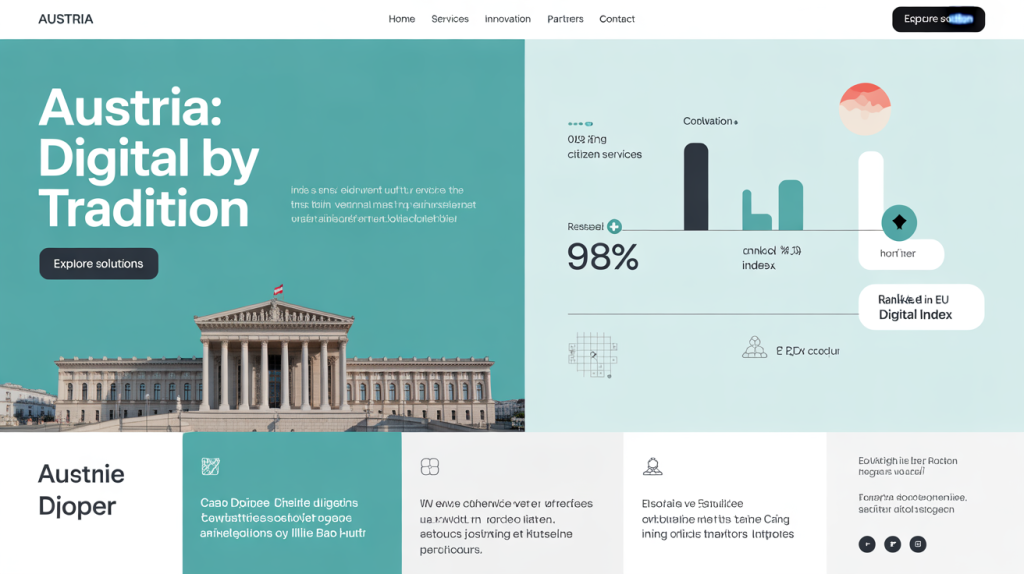How Austria Is Leading in E-Governance and Digital Innovation
Aligning Digital Governance with Education
Progress and User Satisfaction
Key Elements and Innovations
Research and Development
Governance Structure
Conclusion
Call to Action
The E-Government Strategy 2023
In March 2023, the Austrian Federal Ministry of Finance (BMF) adopted the E-Government Strategy 2023, marking a significant milestone in the country’s digital journey. This strategy aims to create a more cohesive, efficient, and citizen-centric government through digital transformation.
Key Focus Areas of the E-Government Strategy
-
Citizens: Digital services are designed to be user-friendly and accessible, saving citizens time and effort.
The strategy emphasizes the protection of digital identities and promotes open communication while enabling end-to-end and cross-border digital services for simplified management. -
Businesses: Austria’s approach to serving enterprises focuses on user-centric, multi-device digital services available in multiple languages.
Businesses can securely access and manage their data, with the strategy implementing the “once-only principle” to reduce administrative burdens. -
Administration: Recognizing the importance of modernizing internal government operations is crucial to effectively support the delivery of digital services.
Such modernization enhances the infrastructure that continually streamlines processes for both citizens and businesses. - Overall Architecture and Basic Components: This area ensures that the technical foundation supports the entire e-governance ecosystem, facilitating seamless interactions across different government layers.
Aligning Digital Governance with Education
The advancements in Austria’s e-governance framework directly impact international student recruitment by streamlining the admissions process and ensuring efficient communication between universities and prospective students. This aligns with the goals of Study in Austria, as it emphasizes making education accessible and manageable for international students.
Progress and User Satisfaction
Austria’s e-government initiatives have shown notable progress, reflecting high user satisfaction levels. According to the eGovernment MONITOR 2024 study, there are compelling insights into the acceptance and usage of digital administrative services in Austria, indicating positive outcomes from the implementation of various digital strategies.
Implications for Educational Institutions
Increased user satisfaction translates into more trust in governmental processes, which can encourage international students to choose Austria for their studies. The transparent and efficient governance can alleviate concerns regarding administrative hurdles, making the prospect of studying abroad more appealing.
Key Elements and Innovations
A noteworthy feature of Austria’s e-government success is the implementation of innovative digital projects, such as the Citizen Card. This initiative provides citizens with secure access to government services, facilitating engagement with public institutions online.
Educational Impact
These advances are pivotal for educational institutions, as they can utilize secure digital platforms to manage student data and interactions seamlessly.
As Study in Austria partners with various universities, leveraging such government innovations can enhance recruitment efforts and improve service delivery.
Research and Development
Austria’s commitment to e-governance is bolstered by academic research. Institutions such as the Department for E-Governance and Administration are deeply involved in studying the effects of digital and social transformation on strategy, organization, and processes. This research-based approach ensures that Austria’s digital initiatives are grounded in sound theoretical frameworks and responsive to emerging technological trends.
Connecting Research to Education
For international students, Austria’s research-driven approach to e-governance translates into high-quality educational experiences.
Universities equipped with cutting-edge research can offer degrees that not only meet current job market requirements but are also innovative and forward-thinking.
Governance Structure
The implementation of Austria’s e-governance vision is supported by a well-defined governance structure with key principles that facilitate coordination across different government levels.
This broad approach ensures a unified strategy for digital transformation and public administration.
Strengthening Educational Recruitment
Such a cohesive governance structure plays a crucial role in enhancing the reliability and predictability of the educational environment.
International students can benefit from a well-organized education system that ensures compliance, quality assurance, and support.
Conclusion
Through comprehensive and strategic initiatives, Austria continues to lead in e-governance and digital innovation, creating a model for efficient, transparent, and accessible public administration in the digital age.
The implications for international education and student recruitment are significant. By being at the forefront of digital transformation, Austria positions itself as a top destination for international students, bolstering its competitiveness in the global education market.
Take the Next Step with Study in Austria
Explore further how our initiatives can benefit you:

